Scania Southern Africa recently handed over several Euro 5 new generation, fuel-saving trucks to the Shoprite group, a valued customer of Scania. These trucks are the first of their kind.
This marked a partnership between the two companies that operate in two different industries but share the ideal of an economically viable, environmentally friendly solution to transport challenges.
The Shoprite Group has acquired 115 of Scania’s Euro 5 G450 A5X4 tractors, with another 140 to follow during the coming months.
Leading the shift
“At Scania Southern Africa, we are leading the shift to sustainable transport solutions,” says Erik Bergvall, Managing Director of Scania Southern Africa. “Our Euro 5 advanced engine platform offers customers like the Shoprite Group proven 10% fuel savings coupled with lower emissions.”
Scania’s partnership with the Shoprite Group started five years ago with the acquisition of several Scania Euro 3 trucks. Since then, extensive demonstrations and road testing on some of the country’s worst roads have been done on these Euro 5 vehicles. These tests proved that the Euro 5 led to a 10% fuel-saving recorded across most applications and sealed the deal for Shoprite to purchase the trucks.
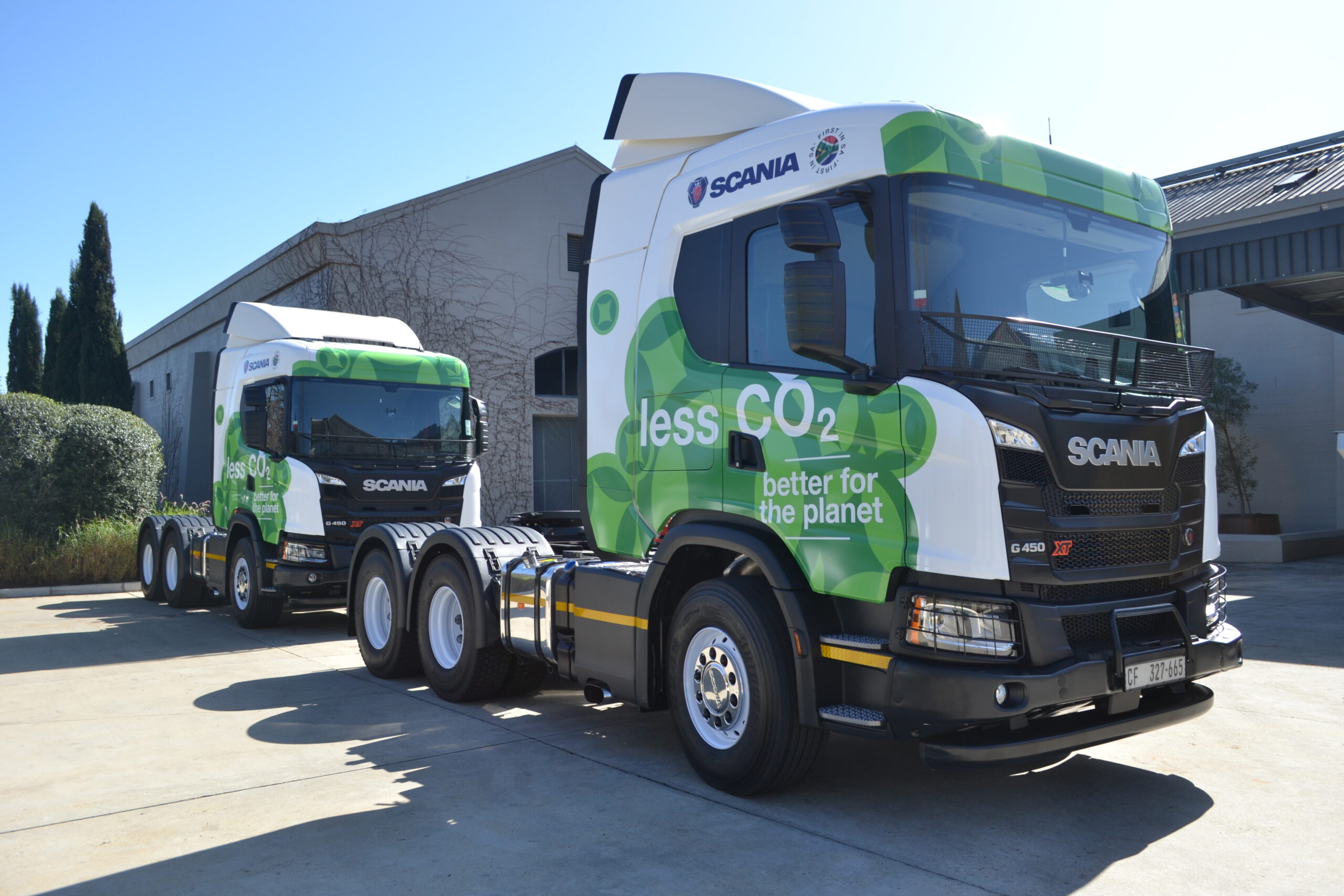
The two Scania Euro 5 trucks are the first of 115 to be handed over, and will be followed by another 140 in a few months’ time (Photo: Tisha Steyn).
Milestone
“This handover is a milestone in our partnership, but in a sense, it is also a destination,” says Mark Erasmus, General Manager of Scania Southern Africa.
“We’ve come a long way over the last five years, and this is cause for celebration. But it’s by no means the final destination. Our journey with Shoprite is only just beginning, and this is but one of the many markers — or milestones — that we will be enjoying together over the years.”
According to Mark, Scania is not just about nuts and bolts or product specifications, but a deep-seated culture that has shaped its operation for 130 years, allowing the company to be “one step ahead, lead the pack and drive the shift”.
Advanced technology
In 2004, Scania was the first heavy vehicle manufacturer to produce a Euro 4 engine, which met the European Union’s emission standards. In 2005, Scania acquired Selective Catalytic Reduction after-treatment to comply with Euro 5.
The Selective Catalytic Reduction (SCR) system is an advanced exhaust after-treatment system which allows the engine to control the production of particulate matter (PM) by increasing the combustion temperature, thus limiting emissions within the permissible value.
This is done by using AdBlue, a urea-based fluid which is automatically sprayed into a vehicle’s exhaust system to reduce carbon dioxide (Co2) and nitrous oxide (No2) emissions of diesel engines.
According to Mark, 45 one-month tests were done with several different customers with many varied needs. In all cases, the Euro 5 unit was more fuel-efficient than the customer’s existing trucks.
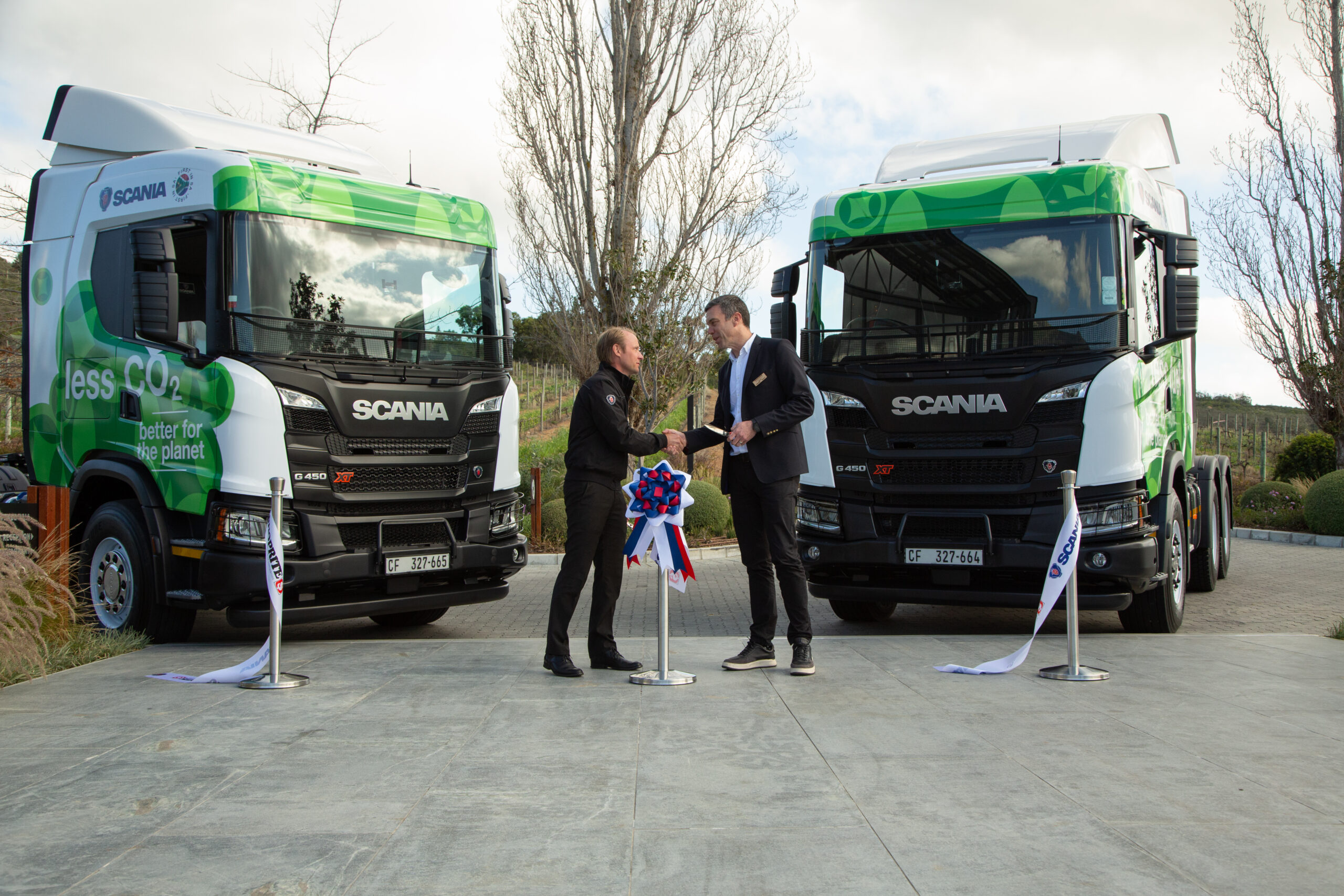
Andrew Havinga of Shoprite and Erik Bergvall of Scania cut the ribbon in a celebration of the partnership (Photo: Supplied).
Extensive testing
“We are happy that we could prove that Euro 5 is an economically viable fuel solution with unparalleled fuel efficiency and better aerodynamics for a customer like Shoprite. I know that Euro 5 compliance means a lot to Shoprite and that it was a non-negotiable aspect of this deal,” says Johnny-Ray Basset, Scania’s Key Accounts Manager.
The first vehicles that were tested in 2018 were the Scania Euro 3 P410 and G460 6×4 truck tractors.
Johnny Ray says: “Following the success of the testing of our demo vehicles, which includes driver training and monitoring of the vehicle performance on our Scania fleet management system, Shoprite decided to take delivery of 16 Scania PGR – 410 truck tractor.”
These vehicles were sent on the road, servicing the northern region of South Africa where the roads are notoriously in poor condition. “Even in these conditions, the tests were highly successful with excellent fuel consumption.”
According to Jonny-Ray, the Euro 5 has several features that met Shoprite’s objectives. These include a comfortable spacious cab, and safety features like EBS brakes, hill-hold system, lane departure warning system, rain sensor and adaptive cruise control. The wider windscreen also provides better visibility.
Shoprite drivers were provided with extensive driver training to equip them with the skills and knowledge they require.
In addition, Scania offers flexible custom-made maintenance solutions and on-site servicing by its technicians, which provide preventative maintenance, thereby decreasing downtime.
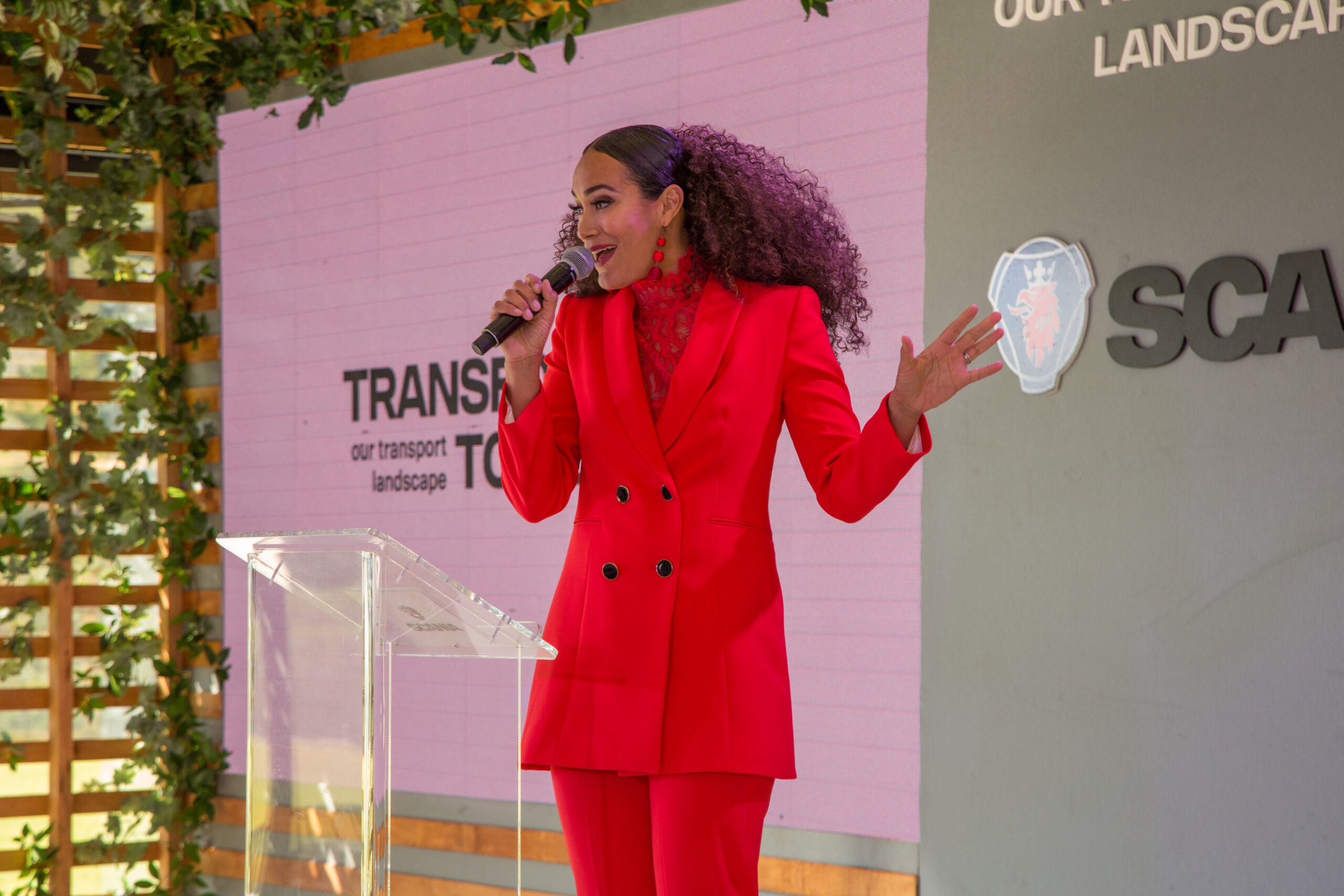
Vivacious Jo-Anne Strauss was the host during the glamorous handover proceedings (Photo: Supplied).
Three pillars
According to Erik, Scania’s decisions are supported by three sustainability pillars:
- Energy efficiency: Scania is constantly improving vehicle efficiency, which leads to improved fuel consumption and lower operating costs for customers.
- Alternate fuels with the aim of reducing Co2 emissions: Scania has pioneered the use of alternative fuels for the past three decades
and currently has the widest range of alternative fuel-enabled vehicles globally. - Smart and safe transport: Scania has more than 500 000 connected vehicles, which increases the company’s potential to tailormake service solutions and deliver higher uptimes.
“These pillars are our true north, pointing in the same direction as Shoprite’s goals. Like Shoprite, we are here to collaborate with other partners, to assist, guide and influence customers, local, regional, and national government, industry bodies and NGOs around the importance of environmental stewardship, for the mutual benefit of society. We are doing this together because we believe in the same principles and share the same objective: to create a better future for those who come after us.”
“There are no compromises for our customers when adopting our sustainable transport solutions,” concludes Erik. “Our partnership with Shoprite is pioneering the way to a more sustainable future that will yield great benefits, not only to the transport industry but also to our economy, people and the environment.”
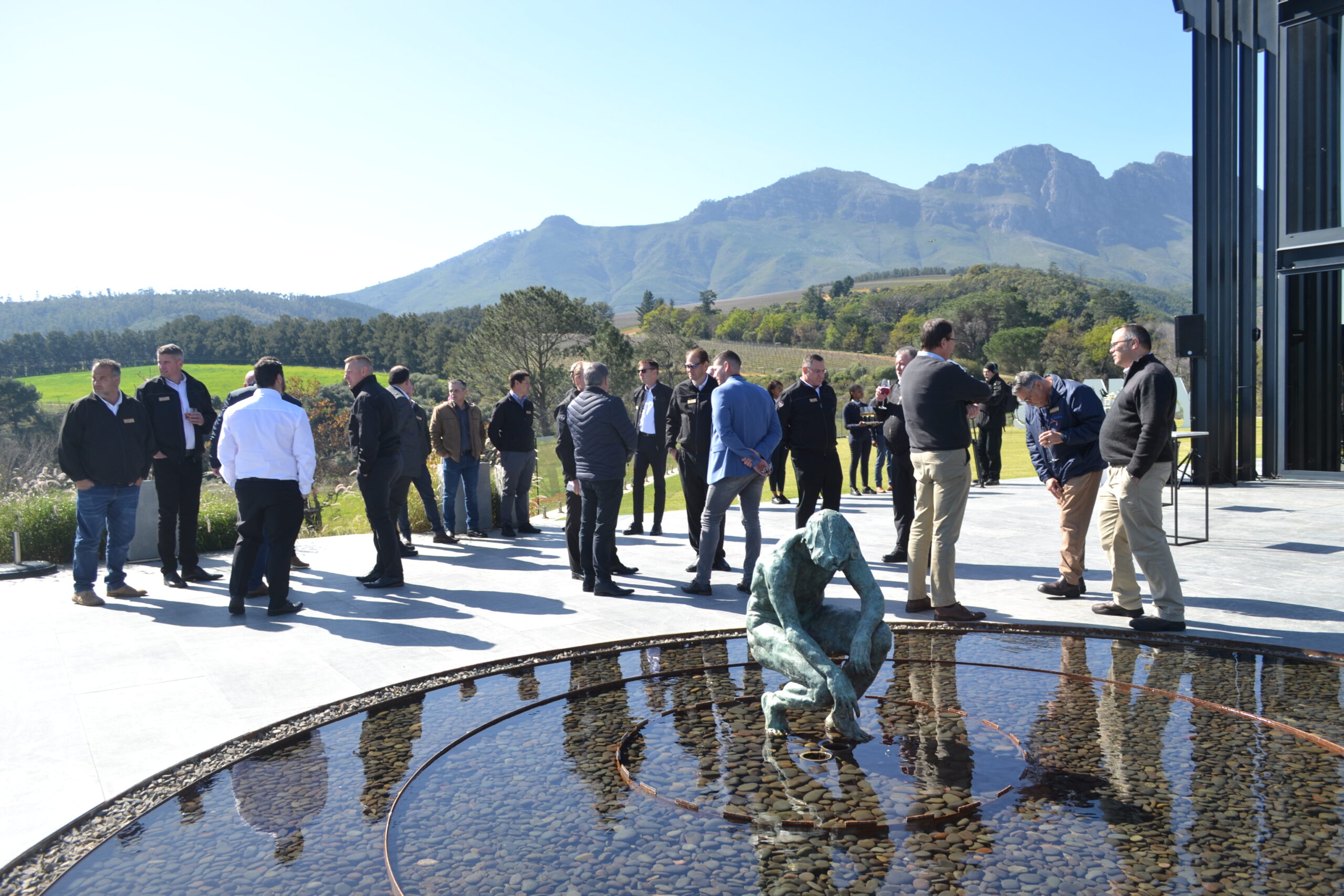
Guests gathered before the handover dinner in front of the Quoin Rock wine lounge, which provided a perfect setting for the celebration of a powerful partnership (Photo: Tisha Steyn).
Shoprite
Shoprite’s transport system is extensive and requires optimal performance to maximise cost efficiencies.
Shoprite, which started 43 years ago, is Africa’s biggest retail store with 3 000 retail outlets in 11 countries on the continent and with 29 distribution centres. Its fleet consists of 900 trucks and 1 300 trailers, and the group employs 1 300 truck drivers among its 149 000 employees.
“We focus on making improvements, instead of making excuses,” says Andrew Havinga, Shoprite’s Chief Supply Chain Officer.
“Shoprite aims to be Africa’s most affordable, accessible, and innovative retailer, and to do this in a responsible way for our communities and the environment.
“We make sure to leverage our IT capacity, embed sustainability measuring and monitoring into our business operations and decision-making, and focus on building meaningful partnerships that will help scale the impact of our sustainability projects.”
Scania is one such partner
According to Andrew, the Group focuses on competitiveness, sustainability, and minimal environmental impact. “We must decide which products and how much our customers need because we don’t want waste and we want to give our customers what they want.”
He believes the partnership with Scania and the acquisition of the vehicles is a “big leap forward. The consumer will feel the impact at the till.”
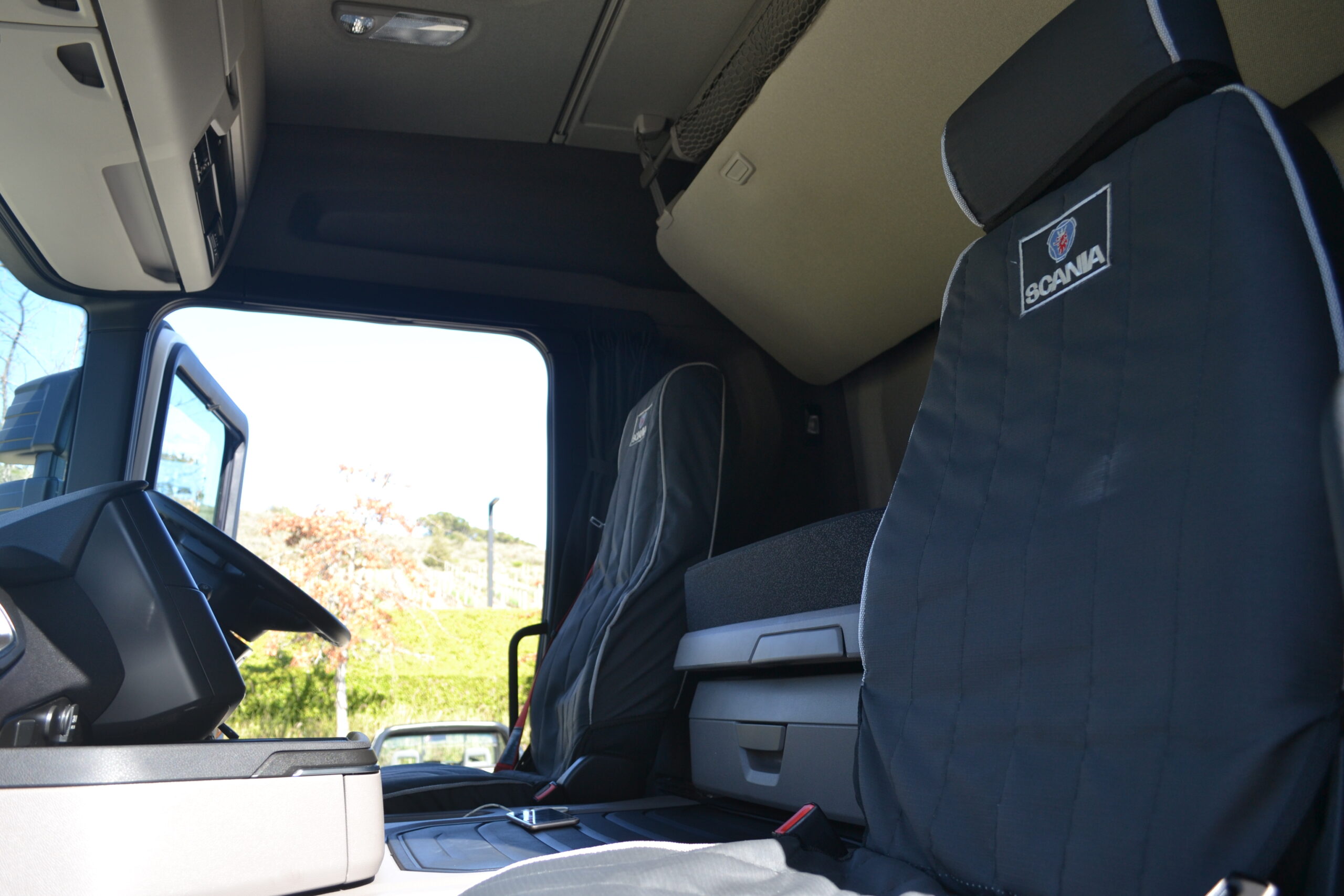
Besides fuel efficiency, the Scania Euro 5’s features focus on driver safety and comfort (Photo: Tisha Steyn).
After-sales service
While fuel efficiency is important, the after-sales maintenance provided by Scania technicians is also crucial to minimise downtime,” says Shoprite’s Gordon Brown, National Technical Specialist for the transport division.
To minimise waste, used packaging materials are recycled. Each truck that returns from a delivery brings back packaging material, that is compacted and sold to enterprises that reuse it.
The bulk of deliveries consists of dry goods, which do not need refrigeration.
Fruit and vegetables and other perishables are transported in refrigerated trailers, which maintain temperatures between 1 and 5 °C. Refrigeration units are purchased from a family business, GRW, in Wellington. These trailers are fitted with solar panels, which allow cooling to continue even while the truck is not running, thereby further reducing fuel consumption.
The new Scania trucks will be used in the Western Cape, where Shoprite’s headquarters are based, Eastern Cape, Limpopo, KwaZulu-Natal, Gauteng, and the Free State. Deliveries to stores in Mpumalanga and Northwest are distributed from Gauteng, while the Northern Cape is handled from the Free State.
According to Gordon, new transport units are continuously purchased to keep downtime low. Used Scania trucks are returned to the company. Scania is one such partner According to Andrew, the Group
For more information about Scania, contact Teboho Mankga, the corporate communications specialist of Scania South-Africa’s Marketing and Communications Department, at (+27)11-661-9600, or send an e-mail to teboho.mankga@scania.com.

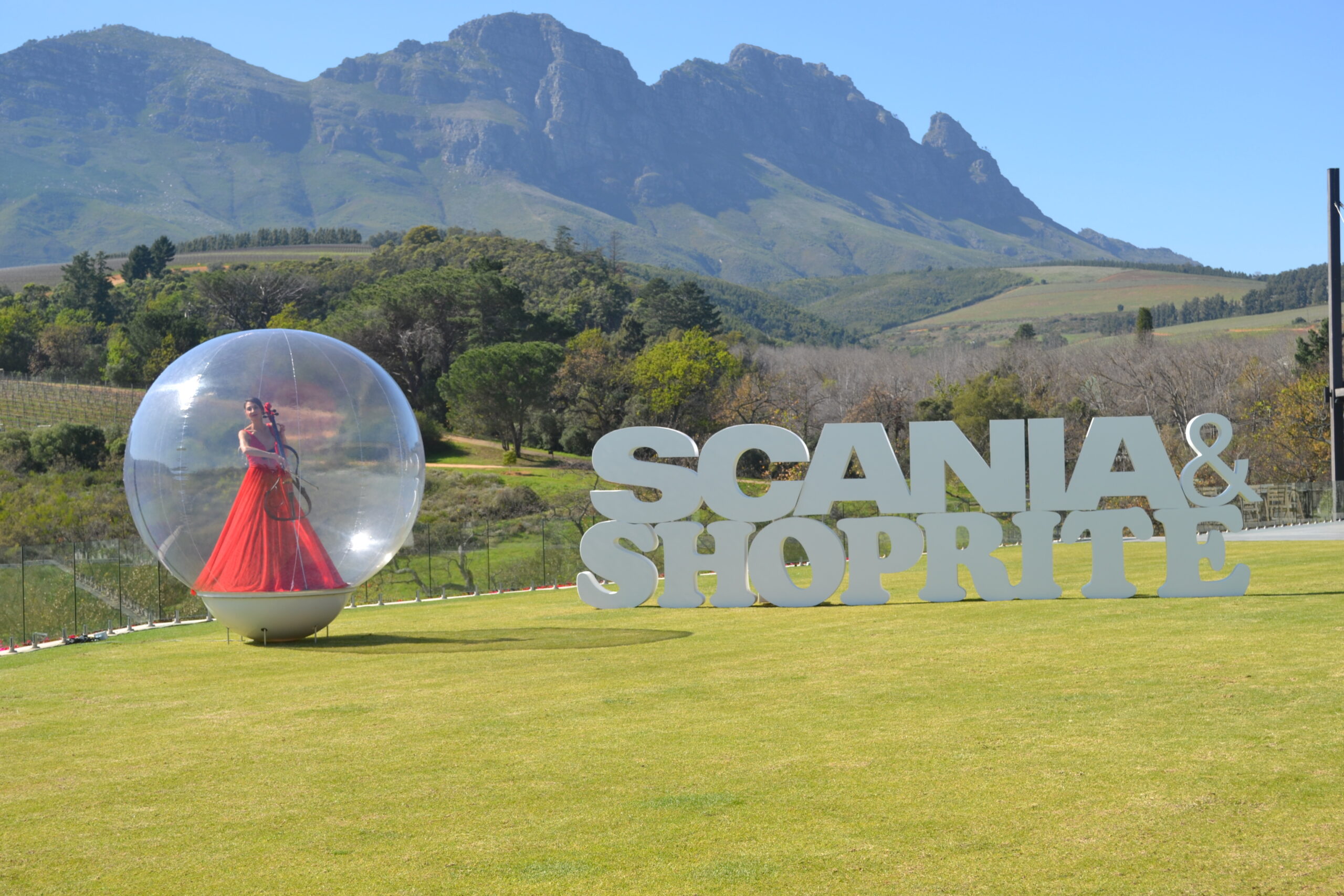








Good day I need job code14 I have dangerous goods and pdp garde 10